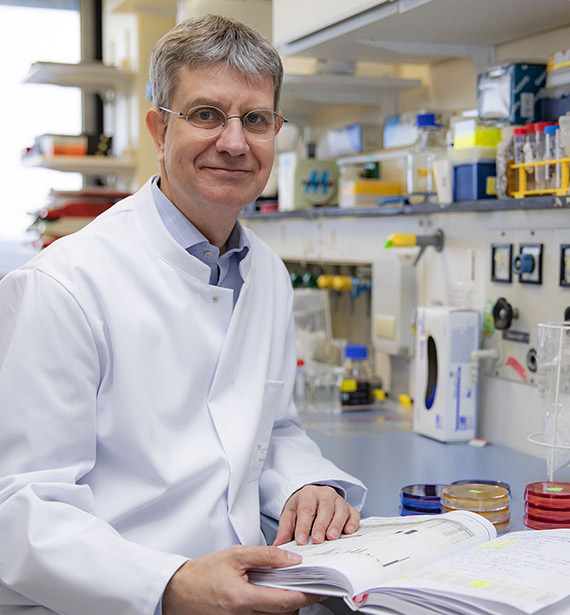Work group Prof. Dr. Dirk Schlüter

Infections with facultative intracellular bacteria such as Listeria monocytogenes and Staphylococcus aureus can lead to serious infections in humans. The control of these bacteria depends on an efficient immune response and intracellular control of the pathogens. An important prerequisite for protective immune responses and anti-bacterial effector mechanisms are post-translational modifications of proteins involved in the immune response and intracellular pathogen control. In our clinical and experimental work, we focus on the function of ubiquitination and SUMOylation as post-translational modifications. Our work shows that deubiquitinases have a decisive influence on the control of Listeria and Staphylococci and that the function of deubiquitinases is cell-type and pathogen-specific. The aim of the work is to gain a deeper understanding of these post-translational modifications in the pathogenesis of infections and to identify new therapeutic target structures.
A second research focus is on clinical questions relating to multi-resistant bacteria, which are being worked on with clinical and experimental cooperation partners.
This work is supported by grants from the German Research Foundation (RESIST), the Federal Ministry of Education and Research and the German Center for Infection Research.
Members of the Work Group Schlüter
Most important publications of the last five years (complete publication list https://orcid.org/0000-0003-1478-3328):
- Zhuang Y, Fischer JB, Nishanth G, Schlüter D (2024) Cross-regulation of Listeria monocytogenes and the host ubiquitin system in listeriosis. Eur J Cell Biol. 103(2):151401. doi: 10.1016/j.ejcb.2024.151401.
- Lindenberg M, S. Waldmann, S. Suerbaum, D. Schlüter, S. Ziesing (2024) External quality assessment schemes in bacteriology support public health in Germany results from 2006 to 2023. Front Mol Biosci. 11:1395410. doi: 10.3389/fmolb.2024.1395410.
- Harit K, R. Bhattacharjee, K. Matuschewski, J. Becker, U. Kalinke, D. Schlüter*, G. Nishanth* (2023) The deubiquitinating enzyme OTUD7b protects dendritic cells from TNF-induced apoptosis by stabilizing the E3 ligase TRAF2. Cell Death Dis. 14(7):480. doi: 10.1038/s41419-023-06014-5 * equal contribution
- Schlüter D, E. Schulz-Niemand, M. Stein, M. Naumann (2022) Ovarian tumor domain proteases in pathogen infection. Trends Microbiol. 30(1): 22-33. doi: 10.1016/j.tim.2021.04.002.
- Koschel J, G. Nishanth, S. Just, K. Harit, A. Kröger, M. Deckert, M. Naumann, D. Schlüter (2021) OTUB1 prevents lethal hepatocyte necroptosis through stabilization of c-IAP1 during murine liver inflammation. Cell Death Differ. 28:2257-2275. doi: 10.1038/s41418-021-00752-9.
- Osbelt L, M. Wende, É. Almasi, E. Derksen, U. Muthukumarasamy, T.R. Lesker, E.J.C. Galvez, M.C. Pils, E. Schalk, P. Chhatwal, J. Färber, M. Neumann-Schaal, T. Fischer, D. Schlüter, T. Strowig (2021) Klebsiella oxytoca mediates colonization resistance against multi-drug resistant Klebsiella pneumoniae in the gut via cooperative carbohydrate competition. Cell Host Microbe. 29(11):1663-1679.e7. doi:10.1016/j.chom.2021.09.003.
- Mulas F, X. Wang, S. Song, G. Nishanth, W. Yi, A. Brunn, P.K. Larsen, B. Isermann, U. Kalinke, A. Barragan, M. Naumann, M. Deckert, D. Schlüter D (2020) The deubiquitinase OTUB1 augments NF-kB dependent immune responses of dendritic cells by stabilization of UBC13 in infection and inflammation. Cell Mol Immunol. 18:1512-1527. doi: 10.1038/s41423-020-0362-6.
- Wang X, F. Mulas, W Yi, A. Brunn, G. Nishanth, S. Just, A. Waisman, W. Brück, M. Deckert, D. Schlüter (2019) The deubiquitinase OTUB1 inhibits central nervous system autoimmunity by preventing IFN-γ-induced hyperactivation of astrocytes through stabilization of SOCS1. EMBO J. e100947. doi: 10.15252/embj.2018100947.
- Vital M, T. Rud, S. Rath, D.H. Pieper, Schlüter D (2019) Diversity of bacteria exhibiting bile acid-inducible 7α-dehydroxylation genes in the human gut. Comput. Struct. Biotechnol. J. 17:1016-1019. doi 10.1016/j.csbj.2019.07.012.